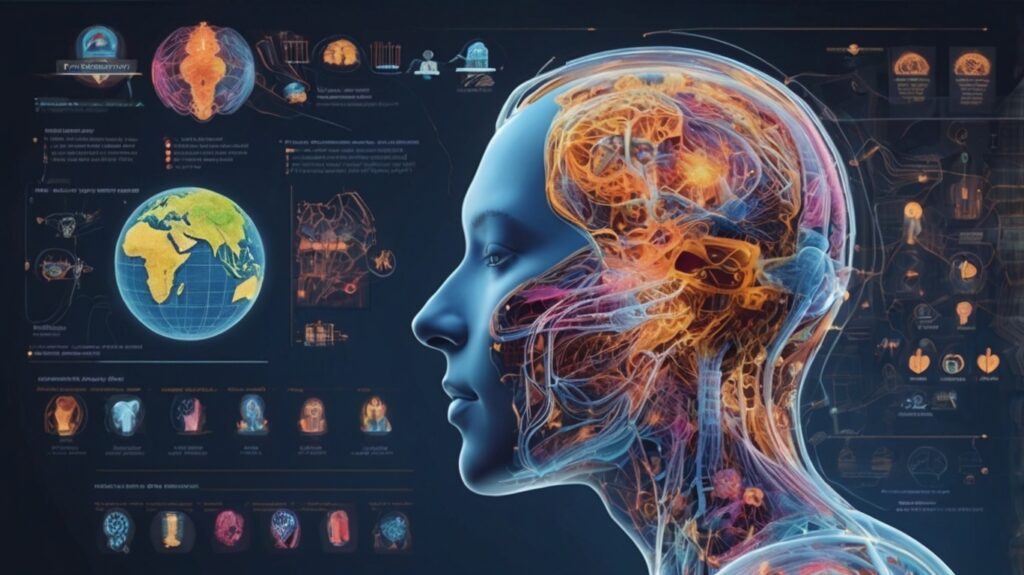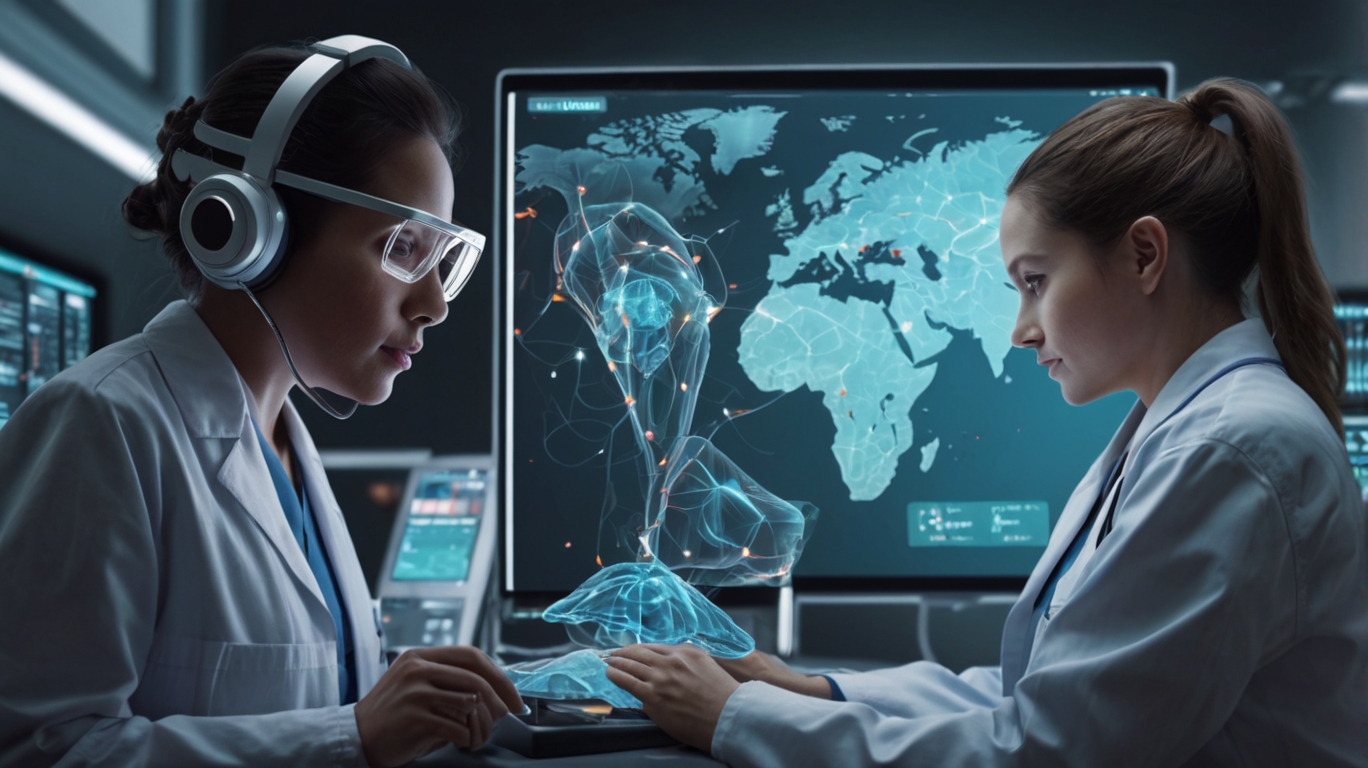The Impact of AI on Medicine :
Artificial Intelligence (AI) is no longer a futuristic concept confined to science fiction movies. It is rapidly transforming various aspects of our lives, and one of the fields witnessing some of the most profound changes is medicine. Across the globe, AI is revolutionizing how we understand, diagnose, and treat diseases, offering new hope for improved healthcare outcomes. This article explores the multifaceted impact of AI on medicine worldwide, highlighting how it’s shaping the future of healthcare and touching lives across continents.
The Dawn of AI in Medicine
Medicine has always been a complex and nuanced field, relying on a combination of science, intuition, and experience. However, the rapid advancements in AI technologies — including machine learning, natural language processing, and computer vision — are opening new doors for medical professionals. AI systems can analyze vast amounts of data far faster and more accurately than humans, allowing for deeper insights and more personalized care.
From the United States and Europe to Asia, Africa, and Latin America, AI’s integration into medical practice is growing steadily. Although challenges remain, the potential benefits are enormous, ranging from early disease detection to optimizing hospital operations.
Enhancing Diagnostics: Faster, More Accurate, and Early Detection
One of AI’s most celebrated contributions to medicine is in diagnostics. Early and accurate diagnosis is critical in managing illnesses, and AI tools are making this more achievable than ever. For example, AI algorithms can analyze medical images — such as X-rays, MRIs, and CT scans — with remarkable precision. They can detect subtle patterns and abnormalities that might be missed by the human eye.
Take the case of cancer diagnosis. AI-powered tools like Google’s DeepMind and IBM Watson are helping radiologists and pathologists identify tumors earlier and classify them more accurately. This early detection significantly improves patient survival rates, as treatments can begin at less advanced stages.
Similarly, AI is being used to diagnose retinal diseases in ophthalmology, skin cancer through dermatological images, and even rare genetic disorders using vast genomic data. These advancements are democratizing access to high-quality diagnostic services, especially in regions where specialists may be scarce.

Personalized Medicine: Tailoring Treatment to the Individual
Medicine has traditionally followed a “one-size-fits-all” approach, but AI is paving the way for truly personalized healthcare. By analyzing an individual’s genetic makeup, lifestyle, and environmental factors, AI systems can recommend treatments tailored specifically to that person.
This personalized approach is particularly transformative in oncology. AI can help predict how a patient might respond to a particular chemotherapy drug, reducing the trial-and-error aspect of treatment and minimizing harmful side effects. In chronic diseases such as diabetes and heart disease, AI can monitor patient data in real-time, adjusting medications and lifestyle recommendations accordingly.
Beyond treatment, AI is also advancing the development of precision medicine by accelerating drug discovery. Machine learning models analyze vast databases of chemical compounds and biological interactions, identifying promising candidates for new drugs much faster than traditional methods.
Improving Healthcare Access in Underserved Regions
Globally, there are vast disparities in healthcare access. Many rural or low-income areas struggle with shortages of doctors, specialists, and medical infrastructure. AI-driven telemedicine platforms are bridging these gaps, bringing expert care to remote communities.
In countries with limited medical resources, AI-powered diagnostic apps and portable imaging devices enable frontline health workers to detect and manage diseases with greater confidence. For instance, AI chatbots can guide patients through symptom checks and recommend when to seek in-person care.
Moreover, AI is helping translate and interpret medical information across languages, overcoming cultural and linguistic barriers. This capability fosters better communication between patients and healthcare providers worldwide.
Revolutionizing Hospital Operations and Healthcare Management
Beyond patient care, AI is reshaping how hospitals and healthcare systems operate. Managing patient flow, optimizing staff schedules, and ensuring the efficient use of resources are crucial for delivering quality care, especially in overstretched healthcare settings.
AI-driven predictive analytics can forecast patient admissions and discharge patterns, enabling hospitals to prepare better and reduce wait times. Automated administrative systems powered by AI reduce paperwork, allowing healthcare professionals to spend more time with patients.
Supply chain management also benefits from AI by ensuring that essential medicines and equipment are available when needed, preventing shortages or wastage.
Ethical Considerations and Challenges
Despite its promising benefits, AI in medicine also raises important ethical questions and challenges. Privacy and data security top the list, as AI systems require vast amounts of personal health data to function effectively. Ensuring that this data is protected from breaches or misuse is critical.
Bias in AI algorithms is another concern. If AI models are trained on datasets that lack diversity, their recommendations may be less accurate or fair for underrepresented populations. Addressing this requires careful design, diverse data collection, and ongoing validation.
There’s also the question of accountability. When AI tools make diagnostic or treatment suggestions, who is responsible for errors? Establishing clear regulatory frameworks and guidelines is essential to maintain trust and safety in AI-powered healthcare.
The Role of Human Doctors in an AI-Driven Future
A common fear is that AI might replace human doctors altogether. However, the consensus among experts is that AI will augment rather than replace medical professionals. AI excels at processing data and recognizing patterns but lacks the empathy, judgment, and holistic understanding that humans bring.
Doctors will increasingly collaborate with AI tools to enhance decision-making, improve efficiency, and provide compassionate care. This partnership can free up physicians from routine tasks, allowing them to focus on complex cases and patient interaction.
Medical education is evolving to prepare new generations of healthcare providers who can work alongside AI, interpreting its outputs and integrating technology seamlessly into practice.
Global Case Studies: AI Impact Across Continents
North America
In the United States and Canada, AI adoption in healthcare is accelerating through partnerships between tech giants and medical institutions. AI is extensively used in cancer research, radiology, and electronic health records management. Notably, AI-driven clinical decision support systems are helping doctors make evidence-based treatment choices in real-time.
Europe
European countries emphasize ethical AI deployment and patient privacy, often integrating AI within well-established universal healthcare systems. The UK’s NHS, for example, has launched initiatives to use AI for early diagnosis of diseases like sepsis and to optimize resource allocation.
Asia
Asia, particularly China, Japan, and South Korea, is rapidly investing in AI healthcare startups and infrastructure. China’s vast population and data resources offer a unique environment for AI-driven public health management, including outbreak prediction and telemedicine expansion.
Africa
While Africa faces significant healthcare challenges, AI offers a powerful tool to address them. Pilot projects using AI-powered diagnostic apps and portable devices are improving maternal health, infectious disease detection, and chronic disease management in underserved regions.
Latin America
Countries in Latin America are embracing AI to modernize healthcare systems and improve access in rural areas. Telehealth platforms enhanced by AI are growing, alongside initiatives to leverage AI for predictive analytics and personalized medicine.
Looking Ahead: AI’s Future in Medicine
The future of AI in medicine is bright but depends on continued innovation, collaboration, and thoughtful governance. Advances in AI explainability—making AI decisions more transparent—and integration with wearable technology promise even more personalized, continuous care.
Furthermore, global collaboration will be essential. Sharing AI research, data, and best practices can accelerate progress and ensure equitable benefits worldwide.
Governments, healthcare providers, technologists, and patients must work together to create frameworks that balance innovation with safety, privacy, and ethics.
Conclusion
AI is transforming medicine on a global scale, ushering in a new era of diagnostics, personalized treatments, and improved healthcare accessibility. While challenges remain, the potential for AI to save lives, enhance care quality, and reduce costs is immense. As AI continues to evolve, its partnership with human healthcare professionals promises a future where medicine is smarter, faster, and more compassionate.
Across continents, AI’s impact is felt in clinics, hospitals, and remote villages alike—proving that intelligent machines, when guided by human values, can truly transform the world of medicine.
The Impact of AI on Medicine :
FAQ: The Impact of AI on Medicine Worldwide
1. What is the role of AI in modern medicine?
AI helps analyze large amounts of medical data quickly and accurately, improving diagnosis, treatment planning, and patient care globally.
2. How does AI improve disease diagnosis?
AI algorithms can detect patterns in medical images and data that humans might miss, leading to earlier and more accurate detection of diseases such as cancer, retinal disorders, and genetic conditions.
3. What is personalized medicine, and how does AI contribute?
Personalized medicine tailors treatments to an individual’s unique genetic and lifestyle profile. AI analyzes this data to recommend the most effective therapies and adjust treatments in real time.
4. Can AI help improve healthcare access in remote or underserved areas?
Yes. AI-powered telemedicine platforms and diagnostic tools enable healthcare providers to reach patients in rural or low-resource regions, offering expert care without the need for physical travel.
5. How does AI impact hospital operations?
AI optimizes hospital workflows by predicting patient admissions, managing staff schedules, automating administrative tasks, and improving supply chain management to ensure resources are efficiently used.
6. Are there ethical concerns with using AI in medicine?
Yes. Key concerns include data privacy, security, algorithmic bias, and accountability for AI decisions. Addressing these issues is crucial to build trust in AI-driven healthcare.
7. Will AI replace human doctors?
No. AI is a tool designed to assist doctors, not replace them. It handles data-heavy tasks, allowing doctors to focus on complex clinical decisions and patient relationships.
8. How is AI used differently across regions of the world?
In North America and Europe, AI is integrated into large healthcare systems with an emphasis on ethics and privacy. Asia leads in AI healthcare innovation and large-scale applications. Africa and Latin America use AI to improve access in underserved areas.
9. What are the future prospects of AI in medicine?
AI’s future includes more personalized, continuous care through wearables, improved transparency of AI decisions, and greater global collaboration to ensure equitable healthcare benefits.
10. How can patients benefit from AI in healthcare?
Patients receive faster, more accurate diagnoses, personalized treatments, and improved access to medical expertise regardless of location, enhancing overall healthcare outcomes.
read also:




